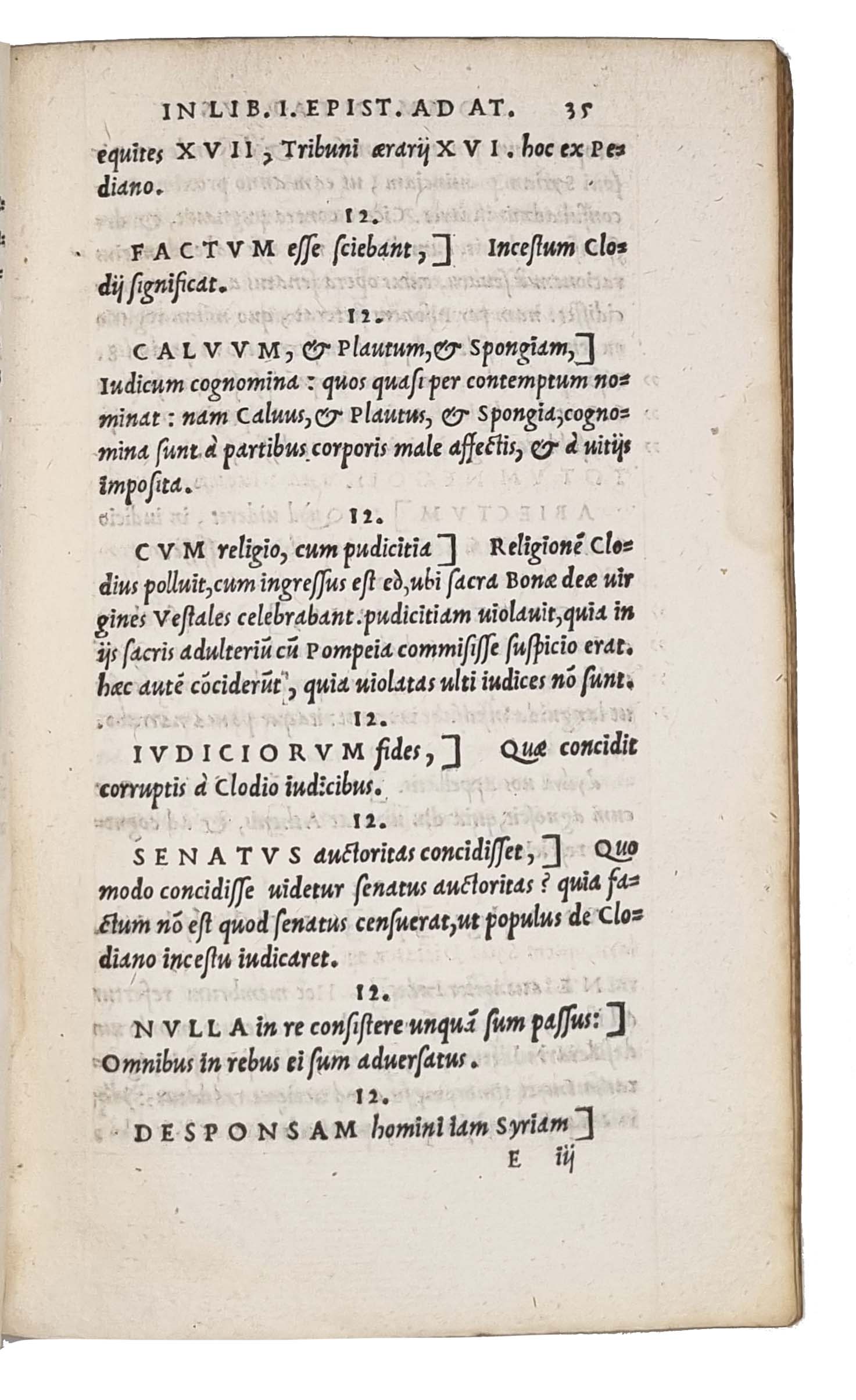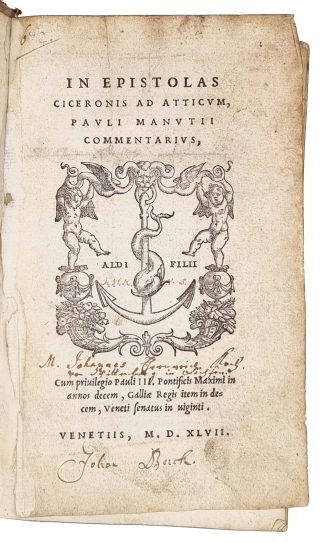MANUTIUS, Paulus.
In epistolas Ciceronis ad Atticum, Pauli Manutii commentaries.
Venice, apud Aldi filios, 1547£1,750.00
FIRST EDITION. 8vo, ff. (vi) 469 (i). Italic letter, text within faded red ink frame throughout. Printer’s device on t-p and verso of last. T-p a bit dusty, small oil splashes to a few blank upper margins and occasional waterstain at gutter, wormhole to final third of volume mostly interlinear. A good copy in early C17 Dutch paperboards, worn, surface loss to spine, outer edges and corners, a.e.g. Autograph “M. Johannes Ehrenricus Koch von Wittenberg in Sachsen” c. 1700, and his initials to t-p and last two ll., C16 ms. autograph “Johan Berck” and ‘692’ to t-p.
Valuable first edition of Paulus Manutius’s learned and celebrated commentary on the 16 books of Cicero’s letters to his closest friend Titus Pomponius Atticus. The youngest son of Aldus, Paulus (1512-1574) was a very influential publisher and one of the most prominent humanists of the Late Italian Renaissance. A master of the epistolary genre with very successful collections both in Latin and vernacular, he was especially engaged in Latin literature, and a passionate Ciceronian. His outstanding reputation as a scholar was built upon his editions and commentaries on the works of Cicero: “no man had a juster conception of the beauties of this great Roman orator and philosopher, and no man has more successfully imitated his style” (Dibdin).
The greatest orator of the Late Republic, Marcus Tullius Cicero (106-43BC) was a Roman statesman, lawyer and scholar. Although he was a ‘homo novus’, namely the first in his family to achieve public office, he soon became one of the leading political figures of the era of Julius Caesar, Pompey, Marc Antony and Octavian. “Perhaps the most valuable of Cicero’s surviving works are the letters, such a vivid commentary on the last years of the Roman Republic as we have of no other period of ancient times. Here alone, devoid of formality, the character of Cicero and his contemporaries can be seen; and a picture appears of life two thousand years ago (…) all the domestic detail which is elsewhere lacking (…) historical facts that would otherwise have been lost or deliberately concealed.” (PMM). Written over the course of many years from 65BC onwards and compiled by Cicero’s personal secretary Marcus Tullius Tiro, the letters to Atticus are frequently written in a subtle code to mask their political content. In his impressively detailed commentary Manutius is clearly aware of this, discussing the implications of certain names and places thoroughly, explaining their relationships to each other and explaining historical and social significance as appropriate.
Interesting provenance. “Johan Berck” was most likely Johan (Jan) Berck (1565-1627). Council secretary and pensionary of Dordrecht (Netherlands) in 1590s, he was appointed first Dutch ambassador to Venice in 1622, from where he returned to Dordrecht in 1627. Berck was an educated man who studied Law in Leiden. The first edition of ‘Ars Historica’ by the renowned Dutch theologian Gerardus Vossius, printed in Leiden in 1623, is dedicated to him. Berck’s chaplain during the Venetian period was Andreas Colvius, a learned man and correspondent of Decartes who spent his time in Venice collecting books and manuscripts. It seems that Berck shared Colvius’ passion for books and brought this copy back to the Netherlands with him. In the 18th century, this volume was owned by “M. Johannes Ehrenricus Koch”, very likely the German scholar M. Johann Ehrenreich Koch, from Wittenberg in Saxony: his name is recorded in a list of academics of the Christian-Albrecht University of Kiel (Holstein, Germany) under the year 1720. He was born in Wittenberg, where he obtained his master’s degree in 1709. Unfortunately, his career as a professor was not particularly successful and his class remained “empty without an audience for two years”. After receiving “a gift of 800 Reichstalers” in 1733, he resigned.
A good copy of this remarkable first Aldine edition, with an interesting ownership history.
USTC 840463; Adams M548; Renouard 140:6: “Commentaire d’un grand mérite”; Brunet III, p. 1383. Not in BM STC It. 16th century or Graesse. PMM 64, Opera 1534-7. T.F. Dibdin, An introduction to the knowledge of rare and valuable editions of the Greek and Latin Classics I (London, 1827). On J. Berck, see: P.J Horsman, Abuysen ende desordiën: archiefvorming en archivering in Dordrecht, 1200- 1920 (2009), p. 353. On M.J.E. Koch, see: P. Hansen, Kurzgefaßte zuverlässige Nachricht von den Holstein-Plönischen Landen (1760), p.42; F. Gundlach (ed.), Das Album der Christian-Albrechts-Universität zu Kiel 1665-1865 (1915), p. 73.In stock




